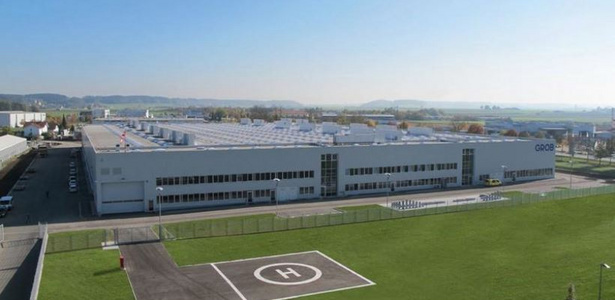The hall was built in two phases, A and B. It was ready for use in February 2012 only eight months after construction work had started and then after another six months the second phase, Hall B, was ready for occupancy. All-in-all, meeting the tight schedule was a huge task for the planners, builders and technical teams. But they did it. After working flat out, Hall 9 was completed, thereby relieving the pressure on working space at Mindelheim by the agreed time. Fortunately, the weather was favorable at the end of last year and this enabled the construction team to work well into December.
A special business unit with excellent links
With the relocation of the "Universal Machines" business unit into Hall 9, practically almost all related functions now work together in this hall, i.e. the entire production process (pre-assembly and final assembly), service, sales (now with its Technical Applications Center), the field trials unit, customer training, not to mention storage and shipping. From the outset the aim was to combine all departments in one hall. Short distances, rapid response time, good communications. Now all departments can link up together because of their physical proximity. The workforce in assembly, including departmental managers and supervisors, is currently 61 permanent employees and 30 contract workers. They assemble up to five units a week, so a new machine is produced pretty well every day.
Huge cost savings from optimum efficiency
With the completion of Hall 9, production capacity has increased considerably at Mindelheim, but not only that. It is now possible to achieve much more efficient procedures, shorter distances and better communications. With the consequence that now only a few months after the start of production, in all sections of Hall 9, there has been a cost saving of up to 20 per cent. The continuous assembly line is a model of efficiency and flexibility: component groups are now transported on "wheels" to ensure speed and flexibility at the assembly stage. The close proximity of pre-assembly to the storage area cuts handling costs. The higher proportion of kanban-scheduled parts has two advantages: order picking time in the warehouse is reduced and there is better material availability in assembly.
The console for the universal machine will in future be pre-installed during primary processing time –as in Hall 6 –and then attached to the machine –as in the automobile industry with the "marriage" of chassis and powertrain. In this way, a large part of the pre-assembly work can carried out on the console, thereby saving just under a whole week of lead time. Because of the close links between pre-assembly and final assembly, employees in pre-assembly can see the outcome of their work ... and this has a direct bearing on quality. The last few "wrinkles" can be quickly ironed out with final assembly. Pre-assembled component groups are delivered right on time to the final assembly position.
Job rotation improves flexibility and quality
In future, employees in universal machine assembly will increasingly be working to a job rotation plan. This means that not only will they be able to assemble a wide variety of component groups, but also install "their" pre-assembled units in final assembly. This assembly system has the effect of adding yet further to quality. Final assembly currently takes place on a fixed site. At the moment, a customer's machine can be completed in full in 5-6 weeks from pre-assembly. Before delivery to the customer, a full-scale quality check puts the machine through its paces.

